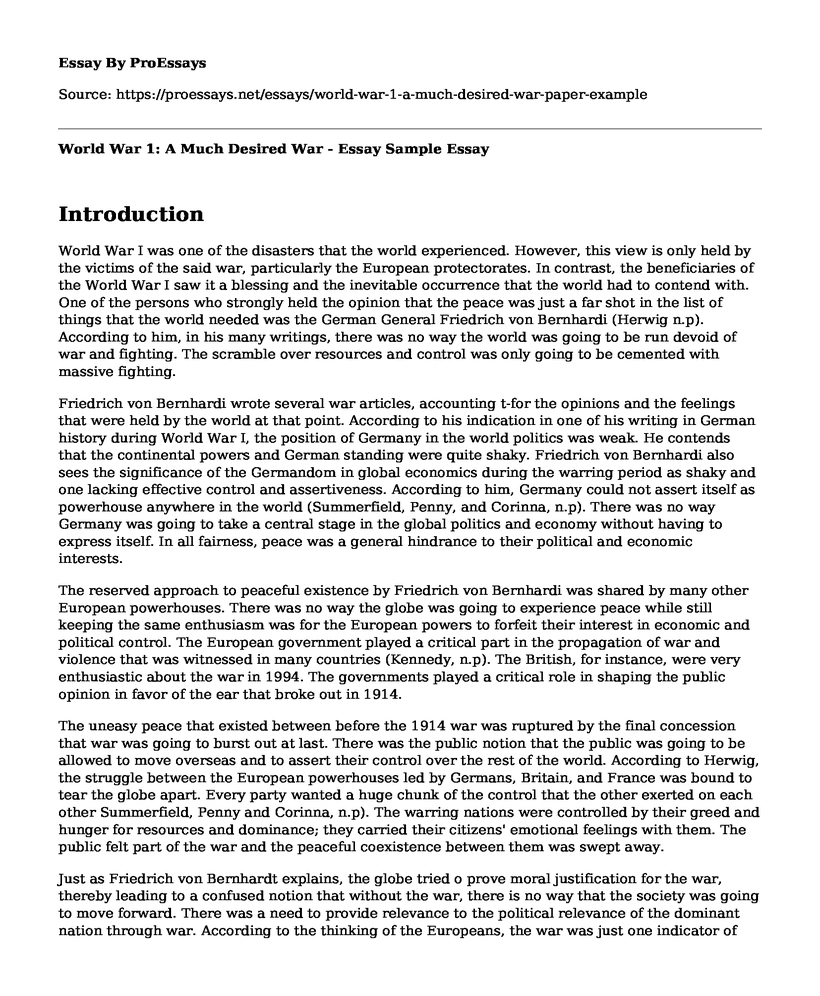Introduction
World War I was one of the disasters that the world experienced. However, this view is only held by the victims of the said war, particularly the European protectorates. In contrast, the beneficiaries of the World War I saw it a blessing and the inevitable occurrence that the world had to contend with. One of the persons who strongly held the opinion that the peace was just a far shot in the list of things that the world needed was the German General Friedrich von Bernhardi (Herwig n.p). According to him, in his many writings, there was no way the world was going to be run devoid of war and fighting. The scramble over resources and control was only going to be cemented with massive fighting.
Friedrich von Bernhardi wrote several war articles, accounting t-for the opinions and the feelings that were held by the world at that point. According to his indication in one of his writing in German history during World War I, the position of Germany in the world politics was weak. He contends that the continental powers and German standing were quite shaky. Friedrich von Bernhardi also sees the significance of the Germandom in global economics during the warring period as shaky and one lacking effective control and assertiveness. According to him, Germany could not assert itself as powerhouse anywhere in the world (Summerfield, Penny, and Corinna, n.p). There was no way Germany was going to take a central stage in the global politics and economy without having to express itself. In all fairness, peace was a general hindrance to their political and economic interests.
The reserved approach to peaceful existence by Friedrich von Bernhardi was shared by many other European powerhouses. There was no way the globe was going to experience peace while still keeping the same enthusiasm was for the European powers to forfeit their interest in economic and political control. The European government played a critical part in the propagation of war and violence that was witnessed in many countries (Kennedy, n.p). The British, for instance, were very enthusiastic about the war in 1994. The governments played a critical role in shaping the public opinion in favor of the ear that broke out in 1914.
The uneasy peace that existed between before the 1914 war was ruptured by the final concession that war was going to burst out at last. There was the public notion that the public was going to be allowed to move overseas and to assert their control over the rest of the world. According to Herwig, the struggle between the European powerhouses led by Germans, Britain, and France was bound to tear the globe apart. Every party wanted a huge chunk of the control that the other exerted on each other Summerfield, Penny and Corinna, n.p). The warring nations were controlled by their greed and hunger for resources and dominance; they carried their citizens' emotional feelings with them. The public felt part of the war and the peaceful coexistence between them was swept away.
Just as Friedrich von Bernhardt explains, the globe tried o prove moral justification for the war, thereby leading to a confused notion that without the war, there is no way that the society was going to move forward. There was a need to provide relevance to the political relevance of the dominant nation through war. According to the thinking of the Europeans, the war was just one indicator of progressive human growth. According to the French government arguments, the war was just one way of expressing political superiority, religious and moral order (Summerfield, Penny, and Corinna, n.p). Victory for any of the European nations were going to give them a sense of dominance and relevance in the future of the global political and economic control; for this reason, peace was an unwelcomed guest at the very least.
Works Cited
Herwig, Holger H. The First World War: Germany and Austria-Hungary 1914-1918. A&C Black, 2014.
Kennedy, Paul. The War Plans of the Great Powers (RLE The First World War): 1880-1914. Routledge, 2014.
Summerfield, Penny, and Corinna Peniston-Bird. "Contesting home defense: men, women and the Home Guard in the Second World War." (2013).
Cite this page
World War 1: A Much Desired War - Essay Sample. (2022, Oct 14). Retrieved from https://proessays.net/essays/world-war-1-a-much-desired-war-paper-example
If you are the original author of this essay and no longer wish to have it published on the ProEssays website, please click below to request its removal:
- Paper Sample on Industrialization
- The Suez Canal War Essay Example
- Essay Sample on Morals of Slavery
- Essay Sample on Alexander the Great: Conquering the World with Martial Leadership
- Essay Sample on USA Economy: 30 Years of Rapid Growth and Inflation
- Essay on U.S. Joins WW2 After Shock of Pearl Harbor Attack: The Guardian Report (1941)
- American War of Independence: Freedom from British Rule - Essay Sample







